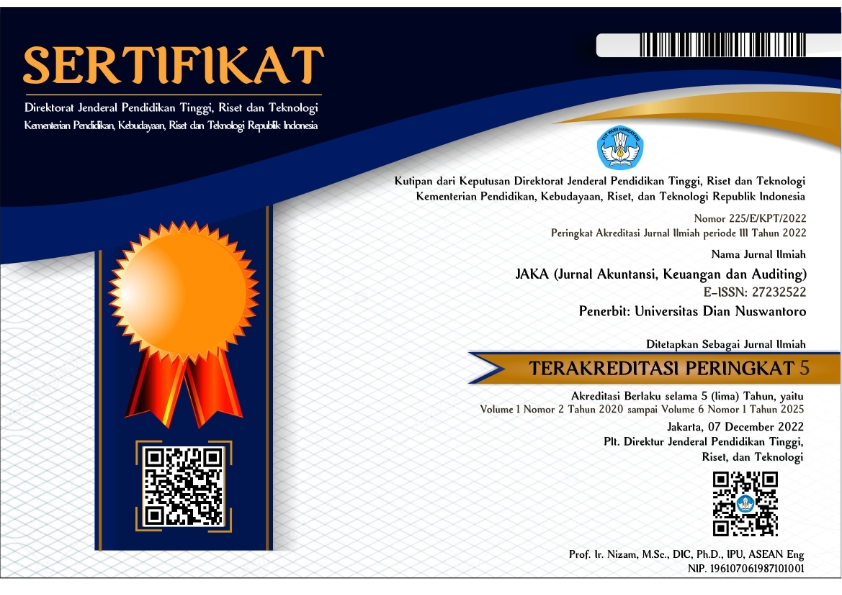Peran Kepemilikan Institusional Sebagai Pemoderasi Pada Determinan Fraudulent Financial Statement: Analisis Fraud Diamond Model
DOI:
https://doi.org/10.56696/jaka.v5i1.10749Abstract
This study employs a fraud diamond model analysis that consists of four factors: pressure, opportunity, rationalization, and capability to examine and analyze those effects on fraudulent financial statements, with institutional ownership as a moderating variable. Purposive sampling was used to choose the study`s sample, which consists of state-owned enterprises (BUMN) that meet the requirements. Regression analysis was employed as an analytical method using a quantitative approach, and this study contained 96 samples. WarpPLS version 8.0 software was used to help with the statistical data analysis needed to test the hypothesis. This study found that pressure, opportunity, and rationalization have a positive effect on fraudulent financial statements, while capability has no effect on fraudulent financial statements. In addition, institutional ownership is able to moderate the relationship between pressure on fraudulent financial statements and opportunity on fraudulent financial statements.References
ACFE Global. (2020). Report to the Nations on Occupational Fraud and Abuse: 2020 Global Fraud Study. Association of Certified Fraud Examiners, Inc., 1–88. https://www.acfe.com/report-to-the-nations/2020/
Achmad, T. (2019). Pengaruh Kualitas Audit dan Auditor Switching terhadap Kecurangan Pelaporan Keuangan: Kepemilikan Institusional sebagai Variabel Moderating. Jurnal Akuntansi Dan Bisnis, 18(2), 110. https://doi.org/10.20961/jab.v18i2.380
Achmad, T., Ghozali, I., & Pamungkas, I. D. (2022). Hexagon Fraud: Detection of Fraudulent Financial Reporting in State-Owned Enterprises Indonesia. Economies, 10(1), 1–16. https://doi.org/10.3390/economies10010013
Agusputri, H., & Sofie, S. (2019). Faktor - Faktor Yang Berpengaruh Terhadap Fraudulent Financial Reporting Dengan Menggunakan Analisis Fraud Pentagon. Jurnal Informasi, Perpajakan, Akuntansi, Dan Keuangan Publik, 14(2), 105–124. https://doi.org/10.25105/jipak.v14i2.5049
Andriani, R. (2019). Pengaruh Fraud Triangle Terhadap Kecurangan Laporan Keuangan ( Studi Empiris pada Perusahaan Manufaktur yang Terdaftar di Bursa Efek Indonesia Rosedian Andriani Magister Akuntansi Universitas Sultan Ageng Tritayasa Pendahuluan Tinjauan Literatur Dan Penge. Risett Akuntansi Tirtayasa, 04(01), 64–74.
Anisykurlillah, I., Ardiansah, M. N., & Nurrahmasari, A. (2023). Fraudulent Financial Statements Detection Using Fraud Triangle Analysis: Institutional Ownership as A Moderating Variable. Accounting Analysis Journal, 11(2), 138–148. https://doi.org/10.15294/aaj.v11i2.57517
Association of Certified Fraud Examiners (ACFE). (2022). Occupational Fraud 2022: A Report to the nations. Association of Certified Fraud Examiners, 1–96.
Association of Certified Fraud Examiners Indonesia. (2019). Survei Fraud Indonesia 2019. Indonesia Chapter #111, 53(9), 1–76. https://acfe-indonesia.or.id/survei-fraud-indonesia/
Ayem, S. (2022). Reslaj : Religion Education Social Laa Roiba Journal Pengaruh Fraud Pentagon terhadap Fraudulent Financial Statement dengan Komite Audit sebagai Variabel Moderasi Reslaj : Religion Education Social Laa Roiba Journal. 5, 56–75. https://doi.org/10.47476/reslaj.v5i1.1362
Bernard, V., Ciesielski, J., Deangelo, L., Fridson, M., Harvey, C., Lee, C., Press, E., Whaley, B., & Zmijewski, M. (1999). The Detection of Earnings Manipulation Messod D. Beneish * June 1999 Comments Welcome. Financial Analysts Journal, 5(June), 24–36.
cnbcindonesia.com. (2023). Jadi Tersangka Korupsi, Ini Kesalahan Dirut Waskita Karya. https://www.cnbcindonesia.com/market/20230502140017-17-433729/jadi-tersangka-korupsi-ini-kesalahan-dirut-waskita-karya
Cressey, D. R. (1953). Other people’s money; a study of the social psychology of embezzlement. In Other people’s money; a study of the social psychology of embezzlement. Free Press.
Daeli, Y. E., Djaddang, S., & Ahmar, N. (2021). Peran Kualitas Audit Dan Deteksi Fraudulent Financial Statement Berbasis Fraud Pentagon Pada Badan Usaha Milik Negara. Riset Akuntansi Tirtayasa, 06(01), 1–15. https://jurnal.untirta.ac.id/index.php/JRA/article/view/10279
Dewi, N. P. G. P., & Yudantara, I. G. A. P. (2020). Pendeteksian Kecurangan Pelaporan Keuangan Dengan Menggunakan Pentagon Fraud Pada BUMN Yang Terdaftar Di Bursa Efek Indonesia. Vokasi : Jurnal Riset Akuntansi, 9(2), 100. https://doi.org/10.23887/vjra.v9i2.27010
Fadhilah, F. N., & Widyananto, A. (2022). Analisis Komponen Fraud Diamond Dalam Mendeteksi Financial Statement Fraud Pada Bank Umum Syariah Yang Terdaftar Di Bursa Efek Indonesia Periode 2014-2018. At-Tamwil: Journal of Islamic Economics and Finance, 1(1), 51–67. https://doi.org/10.33558/attamwil.v1i1.5663
Fahmi, M., & Nabila, S. (2020). Pengaruh Kepemilikan Institusional, Kepemilikan Manajerial, Komisaris Independen Dan Komite Audit Terhadap Integritas Laporan Keuangan Pada Perusahaan Sektor Keuangan Di Bei. Jurnal Bisnis Dan Ekonomi, Vol 2 No.(2), 1–15.
Farmashinta, P., & Yudowati, S. P. (2019). Jurnal Ke 1 Prima Pengaruh Fraund Pentagon Thdp Lp Keuangan. 3(3).
Ghaisani, A. A., & Supatmi, S. (2023). Pendeteksian Kecurangan Pelaporan Keuangan Menggunakan Fraud Pentagon. Owner, 7(1), 599–611. https://doi.org/10.33395/owner.v7i1.1233
Hadi, S., Suryamah, A., & Afriana, A. (2021). Prinsip Business Judgement Rule Dalam Pertanggungjawaban Hukum Direksi Bumn Yang Melakukan Tindakan Investasi Yang Mengakibatkan Kerugian. Acta Diurnal Jurnal Ilmu Hukum Kenotariatan Dan Ke-PPAT-An, 4(2). https://doi.org/10.23920/acta.v4i2.553
Hadiani, Y., Rizani, F., & Nailah, R. (2020). Mekanisme Corporate Governance Sebagai Variabel Moderator Dalam Potensi Kecurangan Laporan Keuangan (Studi Pada Perusahaan BUMN dengan menggunakan Teori Fraud Pentagon). Students Conference on Accounting & Business, 1, 330–345.
Handoko, B. L., Putri, R. N. A., & Wijaya, S. (2022). Analysis of Fraudulent Financial Reporting based on Fraud Heptagon Model in Transportation and Logistic Industry listed on IDX during Covid-19 Pandemic. ACM International Conference Proceeding Series, 56–63. https://doi.org/10.1145/3578997.3579003
Hartadi, B. (2022). Pengaruh Fraud Hexagon terhadap Fraudulent Financial Statements pada Perusahaan Badan Usaha Milik Negara Indonesia yang Terdaftar di Bei pada Tahun 2018-2021. Jurnal Pendidikan Tambusai, 6(2), 14883–14896. https://bumn.go.id/
Lapae, K., Budiantoro, H., Santosa, P. W., & Zhusrin, A. S. (2022). Pengujian Pentagon Fraud Terhadap Kecurangan Laporan Keuangan Pada Perusahaan Badan Usaha Milik Negara (Bumn). Assets : Jurnal Ekonomi, Manajemen Dan Akuntansi, 12(1), 76–94. https://doi.org/10.24252/assets.v1i1.27587
Melati, D. P. A., Kirana, D. J., & Lastiningsih, N. (2020). Laporan Keuangan Dengan Fraud Diamond Dan Family Ownership Sebagai. Jurnal Ilmiah Manajemen Ubahara, 2(Oktober 2020), 15–28.
Mulya, A., Rahmatika, D. N., & Kartikasari, M. D. (2019). Pengaruh Fraud Pentagon (Pressure, Opportunity, Rationalization, Competence dan Arrogance) Terhadap Pendeteksian Fraudulent Financial Statement Pada Perusahaan Property, Real Estate and Building Construction yang Terdaftar di Bursa Efek Indonesia. Permana : Jurnal Perpajakan, Manajemen, Dan Akuntansi, 11(1), 11–25. https://doi.org/10.24905/permana.v11i1.22
Murtanto, M., & Sandra, D. (2019). Pengaruh Fraud Diamond Dalam Mendeteksi Tingkat Accounting Irregularities Dengan Komite Audit Sebagai Variabel Moderating. Media Riset Akuntansi, Auditing & Informasi, 19(2), 209–226. https://doi.org/10.25105/mraai.v19i2.5320
Nugroho, D., & Diyanty, V. (2022). Hexagon Fraud in Fraudulent Financial Statements: the Moderating Role of Audit Committee. Jurnal Akuntansi Dan Keuangan Indonesia, 19(1), 46–67. https://doi.org/10.21002/jaki.2022.03
Nurani, B. K., & Fuad, F. (2022). Penyalahgunaan Aset: Perspektif Model Fraud Pentagon di Lembaga Keuangan Mikro. Owner, 7(1), 379–390. https://doi.org/10.33395/owner.v7i1.1278
Nurhakim, A. L., & Harto, P. (2023). Kecurangan, BUMN Fraud Pentagon: Deteksi Kecurangan Laporan Keuangan Pada Badan Usaha Milik Negara. E-Jurnal Akuntansi, 33(2), 311. https://doi.org/10.24843/eja.2023.v33.i02.p03
Octavianus Lauwrens, A., & Budi Yanti, H. (2022). Pengaruh Elemen Fraud Pentagon Terhadap Financial Statement Fraud dengan Komite Audit Sebagai Moderasi. COMSERVA Indonesian Jurnal of Community Services and Development, 2(4), 966–975. https://doi.org/10.59141/comserva.v2i4.356
Ozcelik, H. (2020). An Analysis of Fraudulent Financial Reporting Using the Fraud Diamond Theory Perspective: An Empirical Study on the Manufacturing Sector Companies Listed on the Borsa Istanbul. In S. Grima, E. Boztepe, & P. J. Baldacchino (Eds.), Contemporary Issues in Audit Management and Forensic Accounting (Vol. 102, pp. 131–153). Emerald Publishing Limited. https://doi.org/10.1108/S1569-375920200000102012
Pambudy, A. P., & Syairozi, M. I. (2019). Analisis Peran Belanja Modal Dan Investasi Swasta Terhadap Pertumbuhan Ekonomi Serta Dampaknya Pada Kesejahteraan Masyarakat. Jurnal Ekonomi Dan Bisnis, 20(1), 26. https://doi.org/10.30659/ekobis.20.1.26-39
Pamungkas, I. D., Ghozali, I., & Achmad, T. (2018). A pilot study of corporate governance and accounting fraud: The fraud diamond model. Journal of Business and Retail Management Research, 12(2), 253–261. https://doi.org/10.24052/jbrmr/v12is02/apsocgaaftfdm
Pramono Sari, M., Kiswanto, Rahmadani, L. V., Khairunnisa, H., & Pamungkas, I. D. (2020). Detection Fraudulent Financial Reporting And Corporate Governance Mechanisms Using Fraud Diamond Theory Of The Property And Construction Sectors In Indonesia. Humanities & Social Sciences Reviews, 8(3), 1065–1072. https://doi.org/10.18510/hssr.2020.83109
Rahayu, R. A., Hariyanto, W., & Almanfaluti, I. K. (2023). Pendeteksian Financial Statement Fraud dengan Menggunakan F-Score Model : Perspektif Fraud Pentagon Theory. Owner, 7(3), 2193–2204. https://doi.org/10.33395/owner.v7i3.1575
Raihan Noval Akbar, Adam Zakaria, & Rida Prihatni. (2022). Financial Statement Analysis of Fraud With Hexagon Theory Fraud Approach. Jurnal Akuntansi, Perpajakan Dan Auditing, 3(1), 137–161. https://doi.org/10.21009/japa.0301.09
Reskino, R., Harnovinsah, H., & Hamidah, S. (2021). Analisis Fraud Tendency Melalui Pendekatan Pentagon Fraud: Unethical Behavior Sebagai Mediator. EKUITAS (Jurnal Ekonomi Dan Keuangan), 5(1), 98–117. https://doi.org/10.24034/j25485024.y2021.v5.i1.4675
Retnoningtyas, S., & Tarmizi, M. I. (2022). Determinan Fraudulent Financial Reporting Dengan Mekanisme Corporate Governance Sebagai Variabel Moderasi. Jurnal Akuntansi Dan Keuangan, 11(2), 101. https://doi.org/10.36080/jak.v11i2.1963
Riantika, R. L. (2021). Anti Fraud dan Whistleblowing Intention: Peran Intensitas Moral dan Pengambilan Keputusan Etis. AFRE (Accounting and Financial Review), 4(1), 95–106. https://doi.org/10.26905/afr.v4i1.5957
riauonline.co.id. (2023). Daftar Kasus Di BUMN Yang Dibongkar Erick Thohir. https://www.riauonline.co.id/nasional/read/2023/01/23/daftar-kasus-di-bumn-yang-dibongkar-erick-thohir
Rizkia, P., Azin, D. M., & Umar, H. (2023). Pengaruh Fraud Star Terhadap Fraudulent Financial Statement Dengan Komite Audit Sebagai Variabel Moderasi (Studi Empiris pada Perusahaan Manfaktur yang Terdaftar di Bursa Efek Indonesia Periode Tahun 2016-2020). Jurnal Riset PErbankan, Manajemen Dan Akuntansi, 7(1), 10–22.
Rostami, V., & Rezaei, L. (2022). Corporate governance and fraudulent financial reporting. Journal of Financial Crime, 29(3), 1009–1026. https://doi.org/10.1108/JFC-07-2021-0160
Sabaruddin, S. (2022). Kemampuan Fraud Diamond Mendeteksi Kecurangan Pelaporan Keuangan Dimoderasi Ukuran Perusahaan. Jurnal Akuntansi Dan Governance, 2(2), 130. https://doi.org/10.24853/jago.2.2.130-140
Santoso, S. H. (2019). Fenomena Kecurangan Laporan Keuangan Pada Perusahaan. Jurnal Magister Akuntansi Trisakti, 6(2), 173–200.
Sari, N. S., Sofyan, A., & Fastaqlaili, N. (2019). Analysis of Fraud Diamond Dimension in Detecting Financial Statement Fraud. Jurnal Akuntansi Trisakti, 5(2), 171–182. https://doi.org/10.25105/jat.v5i2.4861
Sasongko, N., & Wijayantika, S. F. (2019). Faktor Resiko Fraud Terhadap Pelaksanaan Fraudulent Financial Reporting (Berdasarkan Pendekatan Crown’S Fraud Pentagon Theory). Riset Akuntansi Dan Keuangan Indonesia, 4(1), 67–76. https://doi.org/10.23917/reaksi.v4i1.7809
Setyono, D., Hariyanto, E., Wahyuni, S., & Pratama, B. C. (2023). Penggunaan Fraud Hexagon dalam Mendeteksi Kecurangan Laporan Keuangan. Owner, 7(2), 1036–1048. https://doi.org/10.33395/owner.v7i2.1325
Simaremare, E., Handayani, C., Basri, H., Tambunan, A., & Umar, H. (2019). Pengaruh Fraud Diamond Terhadap Pendeteksian Fraudulent Financial Statement Dengan Kebijakan Anti Fraud Sebagai Variable Moderasi Pada Perusahaan Perbankan Yang Terdaftar Di Bursa Efek Indonesia Tahun 2016 – 2018. Prosiding Seminar Nasional Cendekiawan, October, 2. https://doi.org/10.25105/semnas.v0i0.5778
Sumbari, S., Kamaliah, K., & Fitrios, R. (2023). Analisis Model Fraud Hexagon Dalam Mendeteksi Potensi Kecurangan Pada Laporan Keuangan Analysis of Fraud Hexagon To Detect Fraud on Financial Statement. 4(1), 179–196. https://doi.org/10.31258/current.4.1.179-196
Sutisna, U., Yazid, H., & Lestari, T. (2022). The effect of fraud diamond and financial stability on fraudulent financial statement with anti fraud as a moderating variable. Fair Value: Jurnal Ilmiah Akuntansi Dan Keuangan, 4(12), 5368–5378. https://doi.org/10.32670/fairvalue.v4i12.1783
Wardhani, W. K., & Samrotun, Y. C. (2020). Pengaruh Kepemilikan Institusional, Kepemilikan Manajerial, Ukuran Perusahaan dan Leverage terhadap Integritas Laporan Keuangan. Jurnal Ilmiah Universitas Batanghari Jambi, 20(2), 475. https://doi.org/10.33087/jiubj.v20i2.948
Widawati, Y., Ekonomi, F., Negeri, U., Zakaria, A., Ekonomi, F., Negeri, U., Perdana, P. N., Ekonomi, F., Negeri, U., Survei, B., & Indonesia, F. (2019). Pengaruh Fraud Triangle Terhadap Fraudulent Financial Statement Dengan Corporate Governance. 1–12.
Widjaya, S. D., Minarwan, A., & ... (2022). Peran lack of integrity sebagai pemodersi pengaruh fraud triangle terhadap pendeteksian fraudulent financial statement. Fair Value: Jurnal Ilmiah …, 4(8), 3489–3496. http://journal.ikopin.ac.id/index.php/fairvalue/article/view/1449%0Ahttps://journal.ikopin.ac.id/index.php/fairvalue/article/download/1449/1158
Wolfe, D. T., & Hermanson, D. R. (2004). The FWolfe, D. T. and Hermanson, D. R. (2004) ‘The Fraud Diamond : Considering the Four Elements of Fraud: Certified Public Accountant’, The CPA Journal, 74(12), pp. 38–42. doi: DOI:raud Diamond : Considering the Four ElemWolfe, D. T. and Hermanson, D. R. The CPA Journal, 74(12), 38–42.
Wulandari, R., & Maulana, A. (2022). Institutional Ownership as Moderation Variable of Fraud Triangle on Fraudulent Financial Statement. Jurnal ASET (Akuntansi Riset), 14(2), 207–222. https://doi.org/10.17509/jaset.v14i2.44183
Yanti, L. D., & Riharjo, I. B. (2021). Pendeteksi Kecurangan Pelaporan Keuangan Menggunakan Fraud Pentagon Theory. Jurnal Ilmu Dan Riset Akuntansi, 10(5), 1–23.
Yusof, K. M. (2016). Fraudulent Financial Reporting : An Application of Fraud Models to Malaysian Public Listed Companies Being a Thesis submitted for the Degree of Doctor of Philosophy in the University of Hull by Khairusany Mohamed Yusof B . Acc ( Honours ), Universiti Sain. The University of Hull, August, 1–430.
Downloads
Published
How to Cite
Issue
Section
License
Copyright (c) 2024 JAKA (Jurnal Akuntansi, Keuangan, dan Auditing)

This work is licensed under a Creative Commons Attribution-ShareAlike 4.0 International License.













